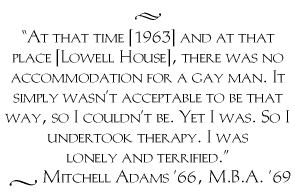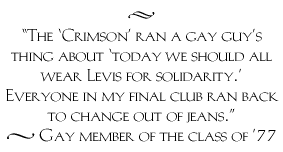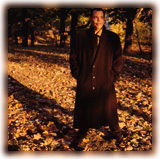Main Menu · Search ·Current Issue ·Contact ·Archives ·Centennial ·Letters to the Editor ·FAQs

Terrified of identifying ourselves, the friends we made were straight. Or we thought they were. Take David Hollander '71, J.D. '74, who was president of the Crimson. At Harvard, he met his current and lifelong boyfriend--Arthur Lubow '73, later the Crimson's managing editor. But although they were good friends, neither knew the other was gay. They recognized their mutual interest three years later. David was closeted and abstinent "because I thought my life would be over if I did anything." During David's stewardship of the Crimson, a freshman from Los Angeles named Gene Hightower '74 came to him, saying he had entered Harvard with the express intention of starting a gay student group. He asked David whether he could get a notice in the paper. "I said I could get him a front-page notice, so I dummied it, and it didn't run. And then again the next night--and finally I realized that Pat, our Roman Catholic typesetter, was just throwing it out and leaving a little extra white space." So David went down to him and said, "Pat, I know you may not like this, but it is going to run in the Crimson tomorrow." So it did--the first such notice ever. But David himself didn't uncork his sexuality until the second year of Harvard Law School, even though he had realized as a teenager way back in Tell City, Indiana, that he was gay. "I had seen Advise and Consent and thought that's what happened to people--you ended up killing yourself. Being gay was just not an option for me." And Harvard at the time did nothing to change his mind.
David went on to edit New Times magazine, to manage a successful entertainment-law practice, and, this year, to chair Gay Men's Health Crisis, the nation's largest AIDS-services organization. He and Arthur, who writes for the New Yorker and elsewhere, have a townhouse in Manhattan, a country home, and the world's most enthusiastic golden retriever.
Gene Hightower, for his part, alive and well in San Francisco, did manage to help start Harvard's first undergraduate gay organization, but recalls how hard it was. "We had to get 10 signatories to qualify," he says, "but it was very hard finding 10 students to do this. They were terrified." Once the 10 had been found, dean of students Archie Epps was good enough to go before the board that charters student groups and vouch for the fact that the requirement had been met--he had verified the list--and ask the board just to take his word for it rather than publicly identify the signatories, which they did. But it was a struggle. Then-Harvard president Nathan Pusey threatened to shut down the group if it tried to incorporate, Hightower recalls; and more than once the Cambridge post office just discarded their outgoing mailings rather than deliver them.
I would guess that most gay Harvard undergraduates were, until recently, like David and me. We simply repressed it or faked it or lived in terror until some time after graduation. "I knew I was gay but had no experiences at all at Harvard," recalls a hugely best-selling author I'll call Rob. "I had major crushes on some guys, but never let anyone know." Nor did he realize at the time that at least one of the guys in his entry, whom he would later meet, was gay, too. Yes, he says, "there were some obvious theatrical gays. But they were stereotypical. There was no real discrimination against them. They sat together and were the fags." ("Gay" is a word Rob heard just once in college.) Unlike me, he wasn't homophobic. "I wasn't attracted to them because they were too nelly and flamboyant. But I wasn't threatened by them, either. They were as nice as they could be to everyone."
Rob dated a little at Harvard but didn't have sex with a woman until he was 25. "She seduced me. She took my glasses off and put them in her underpants and said, 'If you want them, get them.'" He has worn contacts ever since, he says.
 Todd Jennings at the GLSEN party. Photograph by Marc Royce Todd Jennings at the GLSEN party. Photograph by Marc Royce |
That Rob does not feel comfortable being identified in this article speaks volumes. He's independently wealthy by now, after all, much celebrated, and acknowledges that everyone who knows him knows--and that everyone who doesn't know him, if they think about it, would at least suspect (handsome, never married, etc.). But, he says, there is a deep-seated shame, inculcated over a lifetime, that these relatively accepting, liberated last few years simply can't remove. You will not find him attending gay political meetings or marching in gay pride parades.
Todd Jennings '71, M.B.A. '73, amicably divorced father of three, is marching--behind the Harvard banner in New York's 1996 Gay Pride parade. Out from the St. Regis and into the street come a gentleman from the class of '52 and his wife. They haven't any idea what the parade is about, they're just leaving their hotel. They spot the Harvard banner and go right over to Todd.
"Fifty-two," says Frank, the alumnus, extending his hand. "What is this?"
"The Pride march," Todd explains.
Well, Frank and his wife are as proud as anyone and they begin marching, too. "What are these other contingents?" he asks after several blocks.
"It's the Gay Pride march," Todd explains.
Whoosh--they're gone.
As an undergraduate, and later at Harvard Business School, Todd was active in the Owl Club. Recently, he went back for the Owl's hundredth anniversary. "I had been a board member, too, so I knew most of the 140 people who attended the dinner, and I had decided I wouldn't make an issue about my sexuality there." But two drinks into the 11-hour evening, someone from the class of '67 said, in reference to something else, that he never imagined the Owl would have a gay member. "One of my classmates spoke up before I could. 'Todd is gay,' he said. 'And not just that, he's an activist. And we all think that's great.' The other guy got embarrassed and moved off to the other end of the room for a while, although we started talking again later. Much of the rest of the night I spent talking about the Employment Non-Discrimination Act, the Defense of Marriage Act, and lots of gay issues. My primary memory of the evening was the near-total support and unaltered camaraderie I got from nearly everyone. One guy gave me a big kiss good-bye around two in the morning--friendships run deeper than homophobia for most people."
And now for the impossible question: If Harvard had been an open, supportive place when Todd was an undergraduate, as it more or less is today, and the country had been gay-friendly--would he have gotten married? Had kids? Been happier now or less happy?
"Your impossible question is one I've pondered a lot recently," says Jennings. "My first thought is that I had such a wonderful childhood that I've always wanted children myself to share those memories with--and I'm very glad that I do have them. Maybe, in your hypothesized world, I would have decided that godchildren and nieces and nephews could have filled that need. I hope I would not have married a woman, at least not as a closeted gay man."
When he entered Harvard, Todd didn't know he was gay. "But that may be because everyone said nirvana would come when I got to sleep with a woman," he says. "Deep down, I think I knew. I guess the answer is this: In the Harvard world you hypothesize, I would not have married a woman, but I would have had kids, and I'd have been happier not working in a homophobic environment and not having the years of worry about cheating on my wife."

I can't conceive of "not knowing" I was gay, let alone having been married with kids as Todd was. But many do seem to discover their sexuality later in life.
Tom Healy '83 was a philosophy major, a WHRB sports and news broadcaster, and head of the Harvard-Radcliffe Catholic Student Center. A rural upstate New York farm boy, as he describes himself, he dated women during his freshman and sophomore years, then got engaged to a Cliffie. He was having and enjoying sex. He realized only the summer after graduation that he was gay: "I was teaching at Mount Hermon and a man kissed me and it was as blunt an epiphany as that."
Still engaged, Tom spent the next year struggling with what to do, then left "Radcliffe '85," as I'll call her, for "Harvard '87." She is now a happily married doctor in Maine with two kids. They remain friends. Tom and Harvard '87, meanwhile, enjoyed a six-year relationship. They, too, remain friends.
Marlon Riggs '78 told a 1990 lesbian and gay studies conference: "I had come to Harvard, naively, in search of my own black reflection. I awakened, after I arrived, to the realization that I was also gay." And he felt completely alone.
"There were no lesbian/gay studies, then. There were no bisexual/lesbian/gay students associations. There were no 'out' faculty, to my knowledge, nor conferences or seminars that addressed, in the remotest way, the turmoil or the raging questions within me," Riggs continued. "Most days, at lunch and dinner, over the course of my freshman year, I self-consciously surveyed the dining hall, steered a course beyond the anonymous rows of young, white, animated faces, among whom I clearly did not belong; moved further still beyond the cluster of 'Black Tables,' where I knew deep down, no matter how much I masqueraded, my true self would show and would be shunned; and sat, often alone, eating quickly, hurrying my exit from a room where all eyes, I felt, condemned me with unspoken contempt: misfit, freak, faggot.
"Beneath such judgment I did as millions have done before me and since: I withdrew into the shadows of my soul; chained my tongue; attempted, as best as I could, to snuff out the flame of my sexuality; assumed the impassive face and stiff pose of Silent Black Macho. I wore the mask. I was serving time. For what crime I didn't know."
In the middle of his senior year, when Riggs finally decided to act, he did so indirectly: he petitioned his department for a special independent course of study. "I did not explain beforehand how 'special' my study would be. I went before the head of my department and asked whether he could advise me in my 'special' study. He professorially congratulated my initiative, then asked, in an appropriately professional academic tone, what the nature of my subject was. I, 20 years old, answered, quietly, 'The evolution of the depiction of male homosexuality in American fiction and poetry.'"
There was a long, long pause. "'I am not an expert,' he finally announced, 'in that subject.'"
From one professor to the next Riggs went in search of an adviser. "One after another politely but curtly declined me. 'Not my expertise,' said one; 'Not familiar with the subject matter,' explained another; 'Never explored that particular theme.' None of the eminent scholars, I found it odd, would say the word 'gay,' or even 'homosexual.' For the first time in my Harvard experience, indirection and ignorance, it seemed, were passed off as virtues," Riggs explained.
Eventually he found a teaching assistant with a long-overdue, unfinished dissertation on Walt Whitman--a teacher, Riggs realized, far beneath the first rank by Harvard standards. "Yet he was the best Harvard ever offered me. For one simple reason: the history and culture he sought to share with me, at last, spoke to my life. Talked to me! And to my youthful amazement, what I heard in the resonances of this new, living history gave strength and clarity to my own maturing voice."
Marlon Riggs, who died in 1994, must have just missed the institutional thaw, the transition, at Harvard.
"It was still very much of a taboo subject my senior year," recalls a member of the class of '77, who had rowed for Harvard at Henley and chaired his final club's rush committee without ever having revealed his inner thoughts. But, he says, by the time he was at Harvard Business School and a tutor at one of the Houses, from 1980 to 1982, "things had changed dramatically."
 Howard Buford in Manhattan's Riverside Park. Photograph by Marc Royce Howard Buford in Manhattan's Riverside Park. Photograph by Marc Royce |
Howard Buford '79, M.B.A. '83, also black, also gay, was just one year behind Marlon Riggs. He knew he was gay when he was eight. At the College, he saw a notice for a meeting of the Gay Students Association (GSA). "I thought about it a long time," he says, and then, nervously, he went. It was at Phillips Brooks House, maybe 25 people in attendance--three of them, as it turned out, from his floor at Currier House. Much "What are you doing here?" ensued. "It was a time when so many people were coming out. A high-energy time. Gays and lesbians were becoming highly visible both at Harvard and in the country."
"My undergraduate experience at Harvard was really great," says Buford, "and a lot of the people I met through the GSA are some of my best friends today." Not that his life was completely untroubled, but the contrast with Bob '68, who got the aversive shock therapy a decade earlier, is stark. "Prior to attending that first GSA meeting, I had gone to the Student Health Services because I had a lot of anxiety. And at some point I said I wanted to change--to be straight--and the head psychiatrist asked, 'How long have you had these thoughts?' And I said, 'Since I was eight.' And he said, 'Well, you know this isn't going to change.' And it was like, 'Boing!' It was hard for me to hear, but it really made me address the issue--a major injection of reality, and in hindsight spared me a lot of confusion. And they referred me to an off-campus gay group therapy, which was extremely helpful and made a huge difference in my life."
Brand management at Procter & Gamble followed graduation, then Harvard Business School. "HBS was very different, because although there were some tolerant people, the overall feeling was uptight and rigid and narrow and, yes, sometimes hostile...an incredible arrogance of straight white men who felt that everyone else was there by some accident or quota. If I hadn't had such a good experience at Harvard College, I would actually have been more prepared for the B-School. I had sort of let my guard down and immediately realized this was a very different, less tolerant place."
And yet he not only goes back to the business school, he says that "the most surprisingly enjoyable reunions have been there, because a lot of people there are all set to be CEO of someplace and then reality hits them and they find out how subjective and political and unfair the world is and start to get some perspective on what it's like not being part of the 'in group'--and they were just a lot calmer, more relaxed at both my HBS fifth and tenth. Very enjoyable. And of course I always got along fine with the women in the class and the wives." After six years with Young & Rubicam, Howard started his own ad agency, Prime Access, focusing on the gay and lesbian, Latino, and African-American markets. He has 16 employees and clients like American Express, AT&T, and Remy Martin.